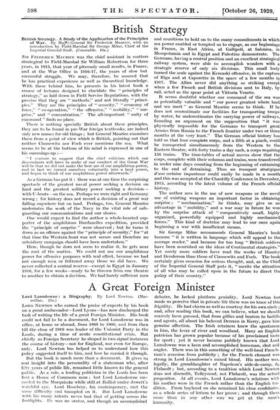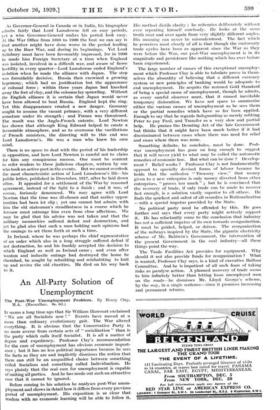A• Great For eign Minister
LORD NEWTON who earned the praise of experts by his book on a great ambassador—Lord Lyons—has now discharged the task of writing the life of a great Foreign Minister. His book could not fail to be a document, for Lord Lansdowne was in office, at home or abroad, from 1868 to 1906, and from then till the close of 1916 was leader of the Unionist Party in the Lords, during a time of acute constitutional crisis. But chiefly as Foreign Secretary he shaped in-two signal instances the course of history—not for England, nor even for Europe, only. Lord Newton has helped us to understand how this policy suggested itself to him, and how he carried it through.
But the book is much more than a document. It gives us real insight into the personality of a statesman who, after fifty years of public life, remained little known to the general public. As a rule, a leading politician in the Lords has been first a House of Commons man ; but Lord Lansdowne suc- ceeded to the Marquisate whileTstihl.nt Baffiol under Jowett's watchful eye, Lord Rosebery, his contemporary, met the same difficulty and trampled on it. But Lord Lansdowne with his many talents never had that of getting-across the footlights. He was no orator, and- though an accomplished
debater, he lacked platform geniality. Lord Newton has made us perceive that in private life there was no trace of this frigidity. He had charm as well as courtesy for his own circle ; and, after reading this book, we can believe, what we should scarcely have guessed, that from gullies and beaters to bailiffs and agents, all about his beloved Derreen in Kerry, gave him genuine affection. The Irish retainers knew the sportsman in him, the lover of river and woodland. Many an English patrician has grown popular because of his proclaimed taste for sport ; yet it never became publicly known that Lord Lansdowne was a keen and accomplished horseman, shot and angler. There was in this something of the well-bred French- man's aversion from publicity ; for the French element was strong in Lord Lansdowne's mixed blood. His mother was, legally, the granddaughter of Napoleon's aide-de-camp, de Flahauft ; but, according to a tradition which Lord Newton does not discredit, Talleyrand, not Flaliault, was the actual progenitor. At all events, Lord Lansdowne's relations with his mother were in the French rather than the English tra- dition. From boyhood on-she remained his close confidante, as a whole series of letters to her prove ; and through them More than irr any other way we get at the man's humanity.
As Governor-General in Canada or in India, his biographer admits fairly that Lord Lansdowne fell on easy periods, yet a wise Governor-General makes his period look easy. At the War Office from 1896 to 1900 the best we can say is that another might have done worse in the period leading up to the Boer War, and during its beginnings. Yet Lord Salisbury must have been favourably impressed, for in 1900 he made him Foreign Secretary at a time when England was isolated, involved in a difficult war, and aware of fierce hostility in every quarter—Lord Lansdowne ended England's isolation when he made the alliance with Japan. The step was formidably decisive. Russia then exercised a growing hegemony, which had no justification but the appearance of colossal force ; within three years Japan had knocked away the feet of clay, and the colossus lay sprawling. Without the English alliance it is certain that Japan would never have been allowed to beat Russia. England kept the ring. Yet this disappearance created a new danger. Germany sought to assume the vacant primacy, with a very different armature under its strength ; and France was threatened. The result was the Anglo-French entente. Lord Newton has shown that although King Edward helped to create a favourable atmosphere, and so to overcome the vacillations of French ministers, the directing will to this end was Lord Lansdowne's. He was a man who knew his own mind.
There is no space to deal with the period of his leadership in opposition, and here Lord Newton is careful not to claim for him any conspicuous success. One must be content to refer readers to these judicious chapters, written by one who took an active part in the events. But we cannot overlook the most characteristic action of Lord Lansdowne's life—his public letter, published in December, 1917, after he laid down office. It appealed for a settlement of the War by reasoned agreement, instead of the fight to a finish ; and it was, of course, furiously denounced. We may agree with Lord Newton that the time was ill-chosen and that earlier oppor- tunities had been let slip ; yet one cannot but admire with him the old statesman's steadfastness in a course which he foresaw must estrange him even from close affections. We may be glad that his advice was not taken and that the military monarchies suffered defeat and destruction, and yet be glad also that such a man holding such opinions had the courage to set them forth at such a time.
In Ireland, where he was perhaps the chief representative of an order which also in a long struggle suffered defeat if not destruction, he and his frankly accepted the decision to which England as well as Ireland came ; and even after wanton and imbecile outrage had destroyed the home he cherished, he sought by rebuilding and reinhabiting to knit up and revive the old charities. He died on his way back to it.



















































 Previous page
Previous page